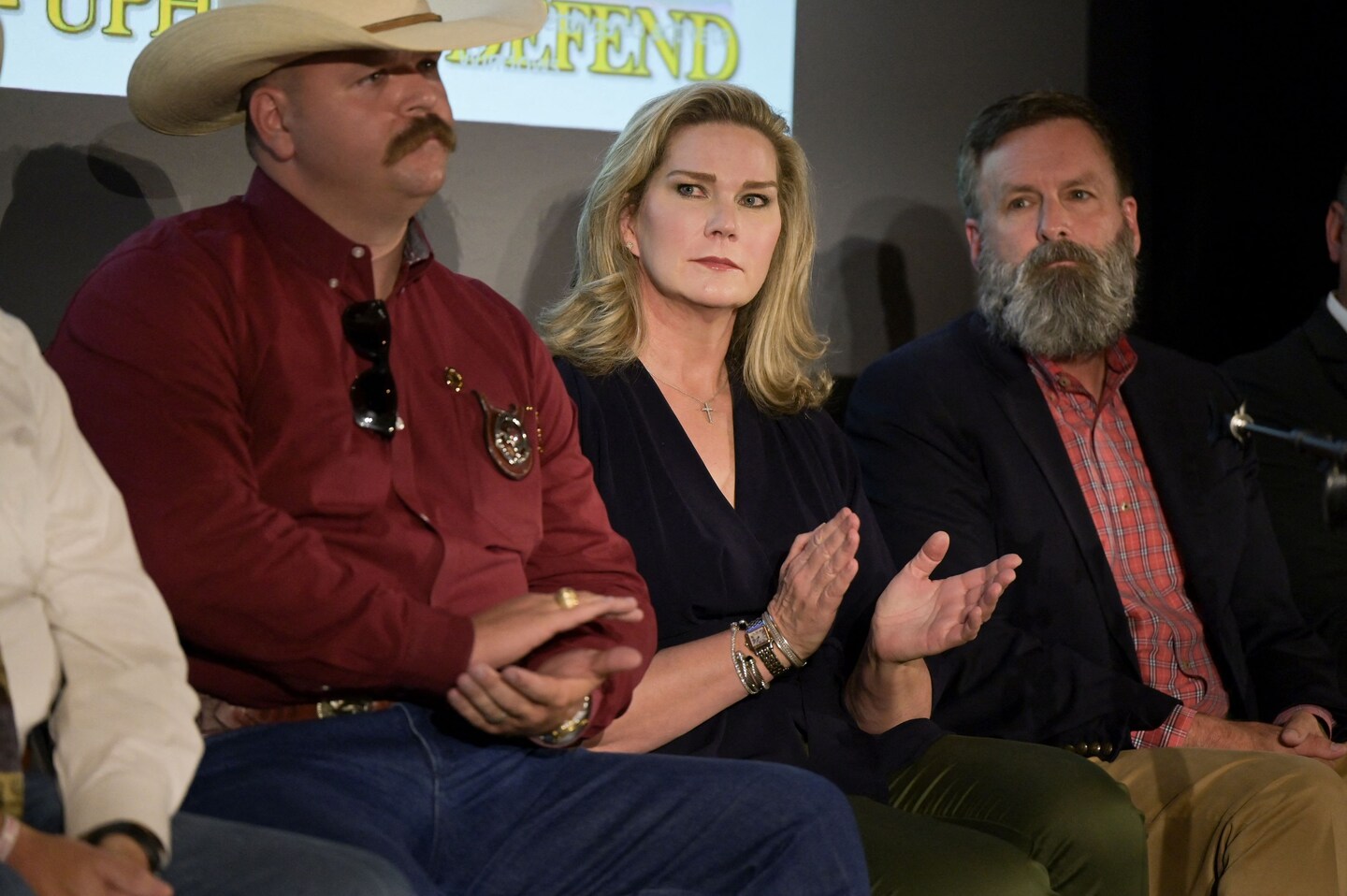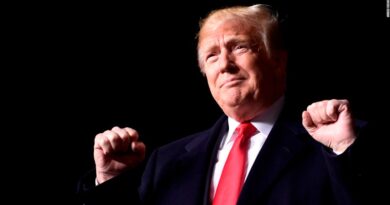Analysis | Another year, another high-profile voter-fraud summit goes bust

But Lindell was in a corner. He’d kept stringing people along for months, promising a big reveal. Whether he knew he didn’t have anything or not, someone did. And this is how cons work: The stakes keep getting increased until the whole thing collapses.
This episode sprang to mind immediately when I started watching “The Pit,” a symposium held in Arizona over the weekend by 2022′s in-vogue election conspiracy theorists, the leaders of the group True the Vote. Same elevation of hype. Same collapse of what was promised.
If you’re at all familiar with True the Vote, this won’t surprise you.
In his book “Everything Trump Touches Dies,” former GOP consultant Rick Wilson describes being engaged by the group at some point before the 2016 election. Wilson and his team prepared to help True the Vote get their message — “millions upon millions of illegal votes are cast in every election” — out to the public.
“[T]here was just one problem,” Wilson writes. “As the leading voter fraud prevention group in the country, True the Vote couldn’t provide enough data to make a convincing case even for us, far less to paint a picture of a massive conspiracy to push illegal voters to the polls.”
He tells that story as context for disparaging Donald Trump’s post-2016 insistence that millions of votes had been cast illegally — a claim that Trump adopted wholesale from a tweet by Gregg Phillips of True the Vote. Phillips never provided evidence for the claim, something that he tried to explain away Saturday as his extrapolation of data on the number of noncitizens who vote in the United States (something that happens extremely rarely).
By 2020, True the Vote’s reputation wasn’t terrific. During a panel discussion in August 2020, a group of conservatives were asked about True the Vote, spurring sharp criticism. Among those warning listeners away was attorney Cleta Mitchell, who would go on to be a prominent figure in Trump’s effort to overturn the election. But True the Vote? Pass.
Then the group got lucky, convincing filmmaker Dinesh D’Souza that they had data showing a widespread effort to collect and cast ballots in swing states. The result was “2000 Mules,” a movie that became a sensation on the right this year because it offered what had long been missing: apparent evidence of enough fraud to have affected the election results.
In reality, of course, the film shows no such thing. It shows no example of anyone casting ballots at more than one drop box, as is alleged, and it shows none of the purported data that Phillips collected to cobble together his estimates of how many “mules” were at work. The only map purporting to show someone visiting multiple drop boxes was fictional, as Phillips admitted to The Washington Post.
D’Souza, like Trump and Wilson, was dependent on True the Vote and Phillips in particular for the claims made in the film. The film documents the downside of that credulity: a filmed interaction in which Phillips suggests that their data analysis solved a murder (to D’Souza’s fawning astonishment) was later shown to have not occurred.
After “2000 Mules” was released, True the Vote, like Lindell before them, promised to release all of the data undergirding their purported investigation. In May, they said they would soon “pull the ripcord,” making all of their information public within a few weeks.
Step 1: 2000 Mules
Step 2: Pull the RipcordTrue the Vote will be releasing the information used to make the movie, including information about the people responsible. According to The Gateway Pundit: pic.twitter.com/Je8QveBkZa
— Kathleen Sharrit (@KSharrit) May 12, 2022
Then it didn’t happen. There was no “ripcord” pulled. In interviews, Phillips pledged that new information would be coming out “ten times” as big as what they’d uncovered in “Mules.” But the actual evidence that they claimed to have found in the film remained under wraps. (They had presented it to some law enforcement agencies, including the Georgia Bureau of Investigation, which didn’t find cause to launch a criminal investigation.)
Finally, True the Vote announced “The Pit.” Phillips said that what would be presented would be “devastating” and include “the part that was left out of the movie.” The media, he insisted, was scared of how devastating the stories would be.
The event was carried on Right Side Broadcasting Network (RSBN), a streaming channel focused on right-wing content. But it was hardly something taking place at the fringe.
RSBN opened with two hosts, including Donald Trump’s attorney Christina Bobb. Bobb was in the news earlier in the week as having signed off on the FBI’s removal of material at Mar-a-Lago, but the role on Saturday was familiar to her: she used to be a host on One America News. Bobb and RSBN’s other host interviewed two prominent Arizona elected officials before “The Pit” even began: Republican secretary of state nominee Mark Finchem and gubernatorial nominee Kari Lake.
Lake was also the event’s first speaker. Well, after the man who offered the invocation. He expressed his hope that the “communist spirit that’s trying to destroy our nation … would hang on the own gallows that they built.”
Finally, it was time for Phillips and his colleague Catherine Engelbrecht to prove the doubters wrong. The result? The announcement of a website Open.ink, at which they promised to dump the drop-box surveillance video they obtained from states and documents from various election lawsuits.
“The ‘pulling of the ripcord’ is Open.ink,” Phillips said. There was no announcement that Open.ink would also include the cellphone geolocation data that Phillips claimed showed the existence of all of the mules in the first place. It’s hard to see what is there, since if you visit at this point, you’re quickly redirected to a sign-up sheet that asks you to create an account that must be approved before you can move forward. But you can catch a glimpse of the underlying site, which includes this appeal.
After revealing the site, the True the Vote team put a coda on that boring-old 2020 stuff.
“And that really I think is …” Engelbrecht said, looking at Phillips — her demeanor indicating uncertainty about taking the next step.
“ … the end of ‘mules,’ we’re done!” Phillips replied with affected enthusiasm.
“The end of ‘mules!’ ” Engelbrecht added. “End scene. We’re done.”
No doubt realizing that this is not what the audience expected — RSBN’s lower-third read “The Pit reveals ‘devastating news on 2020’ ” at multiple points in the program — she tried to contextualize the development.
“Honestly, guys,” she said, “ … it’s time to move on. Not to move on to what happened in 2020, because we still have to understand what happened. That is critical. We have to understand that. But we are 90 some days out from midterms” — and so on.
Sure enough, after the Open.ink announcement, the event itself transitioned away from the claims that made True the Vote famous. A parade of people gave presentations about products they’d developed (an artificial-intelligence lie detector, some sort of phone that prevents being tracked, etc.). A woman from New York described her discovery of a nefarious pattern in voter identification numbers in the state that she alleged gave Democrats an unfair advantage in elections allowing them to indoctrinate children. That sort of thing.
Phillips also gave a presentation loaded with military-style discussions of counterintelligence focused on “protecting” elections moving forward. This was a central thrust of the day: They’d brought everyone together promising to finally demonstrate their 2020 allegations … and then used the day to instead move on to the next thing.
So did Lindell. Shortly before “The Pit” began, RSBN cut away from Bobb and her co-host for a quick ad break. And there was the infamous pillow salesman. But he wasn’t selling pillows; instead, he wanted people to purchase MyCoffee, a brew that leveraged the “volcanic soil and humid climate” of Honduras for the best cup of joe you’ve ever had.
The hustle is ever-evolving.

